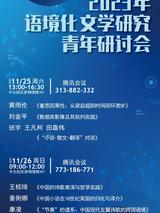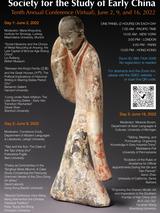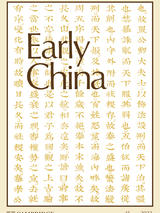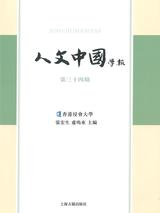Publications
2023

Abstract
本文结合语文学、诗学、阅读史及思想史的研究方法,指出古代中国的文本表演可以是一种具创造性的哲学活动,而非只是以声音演绎书写文本的朗读活动。文中首先指出西汉典籍《淮南子》里跟声音有关的诗歌形式不但有助朗诵表演,更能让读者直观感悟书中哲学思想而不落言筌。而且,这些诗歌形式容许读者通过朗读而实践、内化书中所述之大道。诗歌表演因此跟哲学实践变得同步。可以说,《淮南子》对中国思想的一大贡献在于它将「知道」、「传道」和「行道」三者合而为一。
2022



Abstract
《淮南子》的文本聲景:早期中國的詩歌、表演、哲學與實踐
This article proposes that oral performance could be a philosophical activity in early China. The focus is on the Huainanzi, a densely rhymed philosophical treatise compiled by Liu An in the second century B.C.E. I show that the tome contains various sound-correlated poetic forms that are intended not only to enable textual performance but also, by means of aural mimesis, to encourage the intuitive understanding of its philosophical messages. Thus, scholars of ancient poetry, philosophy, or intellectual history, despite being habituated to reading silently and observing disciplinary boundaries, should be attentive to these sonic patterns in order to do justice to the poetic-cum-philosophical richness and originality of this text. More importantly, I argue that these poetic forms enable readers and audiences to experience, embody, and, above all, enact the Way through textual performance. Thus, thanks to the sound patterns of the Huainanzi, the somatic processes of aural reading and philosophical praxis can occur simultaneously. Vocalization becomes an actionable and repeatable spiritual exercise, which facilitates the intuitive understanding and internalization of philosophical values. In other words, the perennial knowing-doing gap is heroically closed by the Huainanzi.
* * *
本文論證早期中國的文本表演可以是一種具創造性的哲學活動,而非只是以聲音演繹書寫文本的朗讀活動。文中首先指出《淮南子》裏跟聲音有關的詩歌形式不但有助朗誦表演,更能讓讀者直觀感悟書中哲學思想而不落言筌。而且,這些詩歌形式更讓讀者通過朗讀而實踐、內化書中所述之大道。可以說,《淮南子》對中國哲學的一大貢獻在於它將「知道」、「傳道」和「行道」三者合而為一。

Abstract
前賢在分析“有事君人者”章時,往往著眼“天民者”中的“天”字,以為“天民”即大德、其德如天之民。然而,這種解讀方式一方面無視了在《孟子》裏所有作名詞用的“天民”其實都解作“天生之民”,另一方面則無視了“有事君人者”章中的“大人”境界仍在其之上的事實。例如朱熹在解釋“天民”時指出“必其道可行於天下,然後行之;不然則寧沒世不見知而不悔,不肯小用其道以殉於人也”,這就跟《孟子》“大丈夫”“得志,與民由之;不得志,獨行其道”的描述幾乎無異。《孟子》中的“大丈夫”其實就是“大人”,換言之,在朱熹的解釋下,“有事君人者”章中的“天民”跟“大人”竟變得毫無分別。有見及此,本文嘗試另覓出路,以《孟》證《孟》之法,指出“天民者”與“大人”之差異在於前者著重外在事功而後者著重內聖功夫。本文繼而還原“有事君人者”章之本貌,並結合《孟子》“民為貴”章分析,論證“有事君人者”章中“天民”實為動賓結構,“天”作動詞用,“民”則為受事者,“天民者”解作“定天下四海之民者”。在方法學上,有別於清人強調"訓詁明而後義理明",本文嘗試指出"義理明而後訓詁明"之法的可行性和(在一些情況下的)必要性。
* * *
The phrase “tianmin zhe” 天民者 in Mencius 7A:19 has always been rendered as people who possess the heavenly virtue, that is, the greatest virtue. Although widely accepted nowadays, this interpretation is untenable, for two reasons. First, the phrase “tianmin” 天民, when used by Mengzi in other occasions, consistently means “people all under the heaven” 天下之民 or “the subjects of heaven” 天生之民. In other words, the term has never been used to denote moral people. Second, to understand “Tianmin zhe” as people who possess the greatest virtue is to ignore the fact that in 7A:19 “the great men” 大人 actually surpass “Tiangmin zhe” in terms of morality. Since the traditional interpretation is untenable, this essay suggests that the phrase “Tianmin” should rather be understood as a verb-object construction. “Tianmin zhe” are people who, acting on behalf of heaven, put into practice benevolent governance. The word “tian”, when used as a verb, means taking care of and feeding common people in a way reminiscent of heaven giving birth to and feeding common people. This essay also argues that the important difference between “tianming zhe” and “the great men” is that the former place a heavy emphasis on the pursuit of external political accomplishments, whereas the latter set their minds on achieving internal sagacity. Since only the latter is regarded as the ideal type in the Confucian tradition, it is only natural that Mencius places “the great men” at the top of the hierarchy in 7A:19.
2021

Abstract
歷來治《孟》者大多聚焦討論《孟子》〈知言養氣章〉中哲學概念之內涵,卻未曾著力疏通此章之文理。具體言之,此章開首討論「不動心」,結尾卻論孔子,兩段文字究竟有何關係?不少學者通過重新定義此章之篇幅範圍,強行將結尾一段從〈知言養氣章〉割裂出去,如此解讀方式實不理想。本文通過考察〈知言養氣章〉之修辭,指出此章通篇暗用《論語》〈吾十有五而志於學章〉立論,此即其一貫文脈。根據孟子的詮釋,孔子自四十歲起的精神境界,都與進退出處之抉擇相關。循此入手,並結合相關內證,本文指出〈知言養氣章〉章首「動心否乎」之問,只能解作「孟子去齊之志會否因獲得齊國卿相之位一事而動搖?」,而非趙岐所謂在登上卿相之位後才因畏行道之難而動心。本文同時發現,孟子不因卿相高位而動搖去齊之志的壯舉,已成他身後四百年間士人的共同文化記憶。在趙岐之前,每當士人提及不動心,即將之連系到不因權位而出仕,無一例外。可以說,趙注的流行中斷了戰國末年至東漢時期士人的一種文化記憶,也令此章文脈從此變得隱而不顯。
* * *
Scholars have tended to focus on the implications of such philosophical terms as “flood-like qi” 浩然之氣 and “unperturbed mind-heart” 不動心 in Mencius 2A:2, but have failed to identify the common thread of this rather long chapter. This article argues that Mencius 2A:2 frequently alludes to Analects 2.4, and that this allusion is precisely the common thread holding 2A:2 together. According to Mencius’s interpretation, Confucius’s achievements in different ages as stated in Analects 2.4 are all related to the political consideration of whether one ought to remain in a state and serve as its minister. In light of this, and with the support of other evidence from within the Mencius, it is argued that the question “would your mind-heart be perturbed?” at the beginning of the chapter can only mean “would your intention of leaving Qi 齊 be shaken by the fact that you had been appointed as its minister?” but not “would your intention of putting the Way into practice be shaken,” as suggested by Zhao Qi 趙岐 (?-210). Furthermore, it is shown that after the death of Mencius, his act of valor, namely, leaving Qi despite having already been appointed as a Qi minister, had become a shared cultural memory of early Chinese intellectuals. Whenever mentioning “unperturbed mind-heart” in their works, early intellectuals consistently evoked Mencius’s unmoved determination to reject any inappropriate political appointment even though the position could bring them fame and material comfort. The rise of Zhao Qi’s misreading in his commentary to Mencius, however, has led to the loss of this cultural memory.
2019

Abstract
On the Compositional Structure of the Huainanzi
目前西方學者多以為《淮南》二十篇由「本∕道」和「末∕事」兩部分組成,此說幾成定論。然而,《淮南》後序〈要略〉既然一方面要求讀者順序閱讀《淮南》二十篇,同時明確指出不欲讀者「離本就末」,然則《淮南》二十篇就不可能只由「本∕道」和「末∕事」兩部分組成。 本論文通過分析〈要略〉 文義 ,抉發篇中內證 ,指出《淮南》二十篇實由「本/道」、「末/事」以及「大本/大道」三部分組成。 第一部分由開首八篇組成,其論述主題為「天地之理」。第二部分則由第九篇到第十八篇組成,其主題為「人間之事」。第三組的地位最高,由第十九篇〈脩務〉和第二十篇〈泰族〉組成,其主題為「帝王之道」。而〈要略〉指出《淮南》乃「劉氏之書」,「劉氏之書」者皇族之書、帝王之書也。 由此可知闡述「帝王之道」的兩篇實為《淮南》之重心大本。


